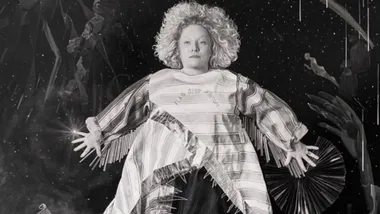Is it just us, or is silly season hitting harder this year? The December rush of Christmas parties, long lunches, and that ‘one catch up drink before the end of the year’ is always busy, but this year it feels exhausting. Coming out of lockdown and straight into party season is giving us whiplash.
If you, too, feel like you’re one mid-week hangover away from a full-blown menty b (that’s ‘mental breakdown’, for anyone who missed its inclusion in the Macquarie Dictionary’s 2021 words of the year), then we’re here to help.
We spoke to Melbourne-based psychologist Chris Cheers for his tips on surviving the silly season when you’re still recovering from lockdown. Exhausted? Dreading another invite landing in your inbox? Read on.
The first thing to understand is that how we feel we’re supposed to feel is very different to how we might actually be feeling, Cheers says.
“Christmas can be a time of expectations,” he told marie claire Australia. “Expectations of what we are supposed to do and where we are supposed to be. And this year I think many of us will feel an expectation of how we are supposed to feel, which is likely different to how we are feeling.”
We’ve just spent two years living through a global pandemic, and for lots of us—especially those in Sydney or Melbourne—we’ve just come out of yet another extended lockdown.
“For many of us, the ‘new normal’ has come as a shock,” Cheers said. “In many ways, your body was not ready. Although you may have been spending a lot of time at home over the last two years, it certainly was not relaxing. You were, and continue to be, living through a global pandemic. Your body has been experiencing constant stress. That’s why it’s normal right now if the thought of Christmas parties and plans leaves you exhausted.”
And although the expectation might be to act as though everything is back to normal and just enjoy it, your body might be telling you something different.
“The stress, grief and challenges we have all faced over the last two years have been unprecedented, which means our need for rest should be unprecedented too,” Cheers said.
Try to acknowledge the difference between your FOMO and what you’re actually ready for
Lockdown has left our brains depleted and accustomed to a slower pace of life, Cheers said. It’s why returning to an extra busy roster of work and social commitments might have left you with “psychological whiplash”.
He recommends taking things at a slower pace than society (and your own expectations) might be telling you to.
“Just like a scuba diver rising to the surface, we have to take it slow to avoid the psychological ‘bends’, Cheers said. “Start with environments that are easier for your brain to process. Less people to Christmas dinner. Less time with family that you find challenging to be around. Less Christmas parties. After the year we have had, this Christmas, less is more.”

Understand your brain tends to overestimate how good things will feel
Have you ever been excited (in theory) for a party, but found it caused you more stress than joy? It might be because our brain tends to overestimate how good things will feel, while skipping over all the bad bits leading up to it. (Case in point: stressing to find the perfect dress for a party that ends up being mediocre at best.)
“This is why finally catching up with everyone at that Christmas party may not have quite lived up to expectation,” Cheers said. “Try to tune out of expectations of how you should feel and tune in with curiosity and compassion to your own emotions. Whatever they may be.”
But know your brain can also overestimate your anxiety, too
Christmas plans with the extended family (particularly if that includes people with differing views on Covid or vaccines) might be making you anxious, but it doesn’t mean you have to cancel plans altogether.
Imagine anxiety as your body’s alarm system, Cheers said, letting you know when it perceives threads in your environment and getting your body ready to manage it.
“However, the last two years have led to long periods of stress, which makes your brain becomes more sensitive to threat,” he said. “This means your anxiety this Christmas might be a bit like that smoke alarm that goes off whenever you’re making toast. And just like that alarm we can listen to it, but then look around and see if there is any real danger. Often when we can move our attention away from our anxious thoughts and focus on the present we can see that there is no actual threat to safety, and choose to do something anyway. Although family Christmas might sound the alarm, it is not a threat to your safety. Just because we are thinking it, doesn’t make it true.”
Know your emotions are valid
Anxiety, worry, fear—these are all valid emotions to be feeling, especially during a time of heightened stress. (And Christmas is, among many things, a time of heightened stress.)
Cheers recommends asking yourself, “Is this social event important or meaningful to me?”, or “Am I willing to make space for this anxiety, in order to attend the event?” Let those answers guide your social calendar. If you choose to stay home and watch a classic Christmas movie instead? More power to you.

Reassure yourself that no, you haven’t lost your social skills
How many times recently have you heard someone joke that they “don’t know how to socialise anymore”? We’d guess: more than once. If this is you, then rest assured you probably haven’t ‘lost’ your social skills in lockdown, your brain has just been focused on more important things (like protection).
“You haven’t lost your social skills, but you may just have to focus on social spaces where you feel safe, and on people you feel most comfortable with,” Cheers said. “This helps ensure your nervous system will stay calm, and those social skills can be accessed.”
Overcome the urge to people please; speaking up might help you all more
This year, one of the most challenging parts of Christmas has become even more difficult. We’re talking about spending time with friends, family or even work colleagues with views different to yours.
Lots of us have a tendency to people please, whether that’s accepting a second helping of Christmas lunch because we feel too guilty not to, or not kicking up a fuss over your cousin insisting on bringing their vaccine hesitant partner to lunch.
But did you know that this is a function of a stressed out brain, rather than a fixed personality type?
While it’s normal to avoid difficult conversations, Cheers said, it’s “useful to recognise that our brains under stress tend to focus on the immediate risk (uncomfortable conversations) rather than recognising the positive benefits that conversation will have”.
He added: “So whilst it might feel like you are doing everyone a favour by not speaking up, you may actually be robbing friends and family of the opportunity to understand your boundaries, and how to support you during this time. Even though it is often the uncomfortable choice, in the words of Brene Brown, clear is kind.”
We’ll raise a toast to that—whether we’re celebrating alone or not.
Lead photo: Bridget Jones’ Diary.
This article is part of the Positivity Project in Partnership with Kellogg’s Special K – empowering Australian women to feel good, strong and confident in their own skin.










